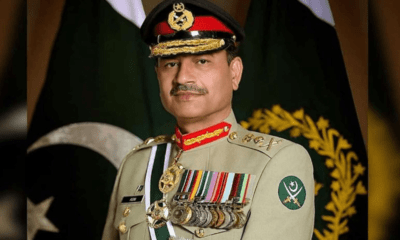News
Military Leadership Supports New Measures to Revitalize Pakistan’s Economy
In a recent shift of focus, Pakistan’s top military leadership vows to collaborate with the government in rejuvenating the nation’s economy. The 259th Corps Commanders’ Conference shed light on plans for structural reforms in the foreign exchange market, task forces on economic matters, and developing the economic potential of border districts. This move signifies the military’s multi-dimensional approach to national security, highlighting the intrinsic link between economic stability and national well-being.

In a recent development, Pakistan’s military leadership, including Chief of the Army Staff (COAS) Gen Asim Munir, has expressed strong commitment towards bolstering the country’s economic growth and investor confidence. The commitment came during the 259th Corps Commanders’ Conference held at the General Headquarters (GHQ) in Rawalpindi last Thursday.
The meeting highlighted the military’s decision to collaborate with the government’s ongoing efforts under the Special Investment Facilitation Council (SIFC) to attract significant foreign investment, according to a statement by the Inter-Services Public Relations (ISPR).
Structural Reforms in Forex Market
The announcement by the top brass follows earlier assurances made by Gen Asim Munir to the business community. During a meeting at the Lahore Corps headquarters last Sunday, he emphasized transparency in dollar exchange rates and interbank rates. This development comes at a time when the Pakistani Rupee has seen a sharp decline against the dollar.
According to insiders from the financial sector, there has been intensified scrutiny on exchange companies, aimed at eradicating illegal currency traders. The State Bank of Pakistan has also initiated new regulations to bring transparency and competitiveness in the foreign exchange market.
Border Districts in Focus
Another critical element discussed during Thursday’s conference was the development potential of newly merged districts (NMDs) and border districts in Balochistan. These areas are considered vital for the nation’s sustainable peace and economic growth.
Economic Task Forces and SIFC’s Role
Gen Asim Munir also revealed the formation of specialized task forces designed to focus on economic challenges and sector-specific issues. He emphasized that the SIFC has the potential to attract investments of up to 100 billion dollars from countries such as Saudi Arabia, the UAE, and Kuwait.
A Holistic View of National Security
While the army’s interest in economic matters may seem unusual, it reflects an acknowledgment that economic security is an integral part of national security. Thursday’s conference also discussed the army’s role in defending the country’s sovereignty against various threats, a concern reflected in the ISPR statement.
Public and Army Relations
The conference underscored the need to maintain a strong bond between state institutions and the general public, dismissing attempts by ‘inimical propagandists’ to drive a wedge between them.
Honoring the Sacrifices
The military leadership paid tribute to the sacrifices made by officers, soldiers, and citizens for the country’s safety and territorial integrity. A Fateha was offered for the martyrs, underlining the army’s commitment to honor them and their families with utmost respect and dignity.
In Conclusion
The military’s move to assist the government in economic matters signifies a multi-dimensional approach to Pakistan’s challenges. By focusing on economic stability, the military is indirectly contributing to national security, thereby showing a pragmatic understanding of the interconnected challenges that Pakistan faces today.
Source: Original information was reported by Iftikhar Shirazi and additional verification was conducted via statements released by the Inter-Services Public Relations (ISPR) and State Bank of Pakistan.







